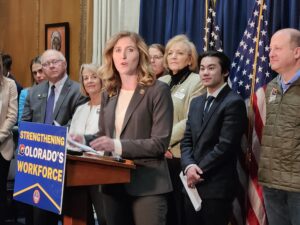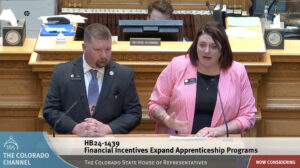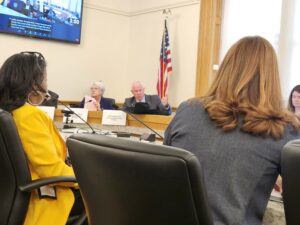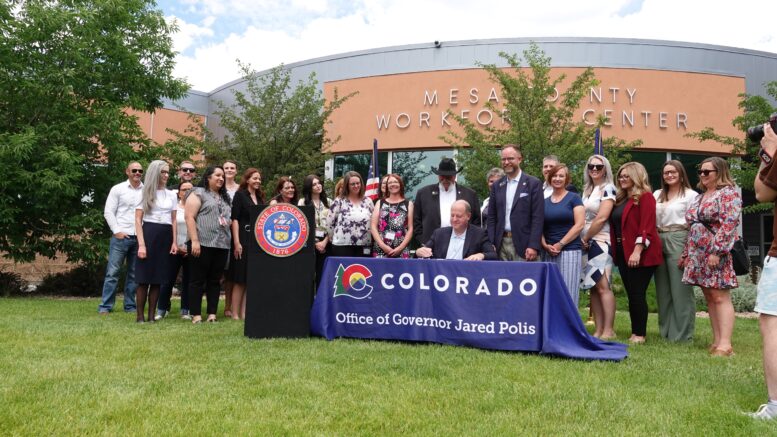With in-migration of workers to Colorado slowing substantially and more students choosing to end their educational journey with a high-school diploma, state employers are struggling to find enough workforce talent to fill job openings — a problem that’s only expected to grow.
While business leaders agree that government doesn’t create jobs, they acknowledge that it has a key role in the workforce-development process, namely producing graduates who are ready either to enter careers or continue the education needed to do so. But for myriad reasons, many of them related to a lack of communication between business and educational institutions, more employers say that they can’t find local applicants with the skills needed to take on jobs that pay family-sustaining wages.
To that end, Gov. Jared Polis and Colorado legislators — spurred by calls from business groups and workforce-training organizations — passed six bills during the 2024 legislative session seeking to ensure that students acquire the skills that employers need. On Friday, the end of the 30-day period for Polis to sign or veto bills, the governor inked the last one of those measures into law, officially kicking off an 18-month period of implementation that could substantially improve the state’s talent-development process.
“A lot of these workforce programs are out there. But there is still a disconnect between what employers need and what credentials are being offered,” Colorado Chamber of Commerce President/CEO Loren Furman told the House Finance Committee on April 3rd while testifying for one proposal, House Bill 1365. “Our number-one goal was to identify what are the workforce gaps that are going unaddressed and what are the achievable solutions we can put in place.”

Colorado Chamber of Commerce President/CEO testifies before the House Finance Committee on April 3.
Why the workforce package is needed
Some of the six new laws identify specific gaps that the state now will try to fill, while others launch processes that will identify areas where career pathways are lacking and need to be established or improved. Five of the laws contain provisions that were recommended in an October report from the Education to Employment Alliance, a coalition of business groups that conducted meetings and research on how to improve the state’s talent-development system.
Colorado continues to have the second-highest percentage of residents that have bachelor’s degrees, but many have moved from other parts of the country — a source of talent that is beginning to dry up as it becomes more expensive to live and work here. State demographer Elizabeth Garner told a Colorado Chamber Alliance meeting in October that in-migration that once averaged 74,000 people per year has dropped to less than 27,000 — and that 400,000 people will age out of the workforce this decade, leaving employers to replace them while also growing another 400,000 jobs.
Meanwhile, the Colorado Talent Pipeline Report calculated that 91.4% of jobs paying family-sustaining wages require education beyond high school — not necessarily a four-year college degree but at least an associate’s degree or some level of certification. However, in 2021, the portion of Colorado high-school graduates seeking to continue their education past high school dropped below 50% for the first time in memory, leaving many new workforce entrants without the skills needed to afford to live and work here.

Colorado state Rep. Meghan Lukens describes HB 1365 during a March news conference to announce the 2024 package of workforce bills.
What the workforce bills will do
To address that collision of circumstances, the six bills take six different approaches:
- HB 1365, sponsored by Democratic Rep. Meghan Lukens of Steamboat Springs and Republican Rep. Matt Soper of Delta, expands the Opportunity Now initiative that offers grants to business and education groups that partner to create new training programs. And it establishes a regional talent-development program, through which the state will host seven summits in which business and education leaders establish and then follow to completion two- and five-year goals to fill talent-short pipelines.
- HB 1364, sponsored by House Speaker Julie McCluskie of Dillon and fellow Democratic Rep. Jennifer Bacon of Denver, creates a longitudinal data system to track the success of programs from early childhood education through college at getting students into careers. It also funds a study to analyze the cost of existing workforce-training systems and potential benefits of consolidating them, all setting the state up to become more efficient with its educational spending.
- HB 1439, sponsored by Democratic Rep. Jenny Willford of Northglenn and Republican Rep. Ron Weinberg of Loveland, creates $15 million in new tax credits available to employers in new and emerging industries who establish apprenticeship programs. It also funds $2 million in grants for employers scaling up such programs and the same amount for groups like chambers of commerce to serve as intermediaries that can connect small- to medium-sized businesses with educational institutions to supply apprentices.

Colorado state Reps. Ron Weinberg and Jenny Willford explain their bill on apprenticeship tax credits on the House floor.
- Senate Bill 104, sponsored by Sen. Jessie Danielson, D-Wheat Ridge, aligns the work of the career and technical education division of the Colorado Community College System with that of the Apprenticeship Colorado agency. In doing so, it requires the agencies to expand the number of aligned pathways to get students into work-based learning and prioritizes fields identified in the Talent Pipeline Report.
- SB 143, sponsored by Democratic Sens. James Coleman of Denver and Rachel Zenzinger of Arvada, mandates development of a system to evaluate nondegree credentials and allow those to be stacked as part of a resident’s educational record.
- HB 1340, sponsored by Democratic Rep. Shannon Bird of Westminster and Republican Rep. Rick Taggart of Grand Junction, creates tax credits equivalent to the cost of two years of public higher-education costs to be used by families earning less than $90,000 annually. University of Colorado President Todd Saliman told the House Finance Committee the bill addresses concerns about college costing Coloradans too much and about too many of the state’s best students leaving the state for higher education and not returning.
“When people leave Colorado for college, they are less likely to come back here to work,” Saliman said on April 22.
Bills impact pre-K education through college
When added together, the six bills are designed to address the full spectrum of workforce-development needs.
HB 1365 and SB 104 particularly will help to develop more pipelines for careers that don’t require four-year degrees for entry, with the summits likely producing more business partnerships with K-12 innovation centers and SB 104 pointing participants to jobs. After 40 years of educational systems emphasizing the need for four-year degrees, employers are more interested now in hiring students without such degrees — as long as they have skills enough to break into sectors and work their way up, said Lawson Miller, career and innovation coordinator for Cherry Creek School District.

Colorado state Rep. Anthony Hartsook questions Reps. Jennifer Bacon and Julie McCluskie about their longitudinal-data bill during a March 21 hearing before the House Education Committee.
HB 1364 will let policy makers evaluate which programs, from preschools to workforce-training grant recipients, and which college majors are and aren’t producing substantial returns on state investment so that they can direct resources to the best places. And at a time when too many employers say talent remains hard to find, HB 1439 will allow them to bring on student workers at various points in their educational journey in a way that benefits both the companies and the learners.
“Advocating for workforce development”
“It’s frustrating sometimes, because we’re here in Colorado with one of the lowest unemployment rates and yet we’re constantly facing these shortages,” Rep. Marc Snyder, D-Manitou Springs, said during a hearing for HB 1365. “I totally believe we can solve this, and I feel this is a good program to putting us on the path to get the jobs we need filled.”
The work within state departments will begin later this year, and the tax credits will be available next year. The regional talent-development summits are expected to kick off as early as this fall, and the reports from them are due by the end of 2025.
“It’s transformative to have members of the business community at the Capitol, advocating for workforce development and improving learner outcomes,” said Colorado Succeeds President Scott Laband, whose organization played a key role in passing the package. “We’re eager to continue this important work with the Education to Employment Alliance, in partnership with Governor Polis and his office, to ensure Colorado learners are prepared for Colorado jobs.”
